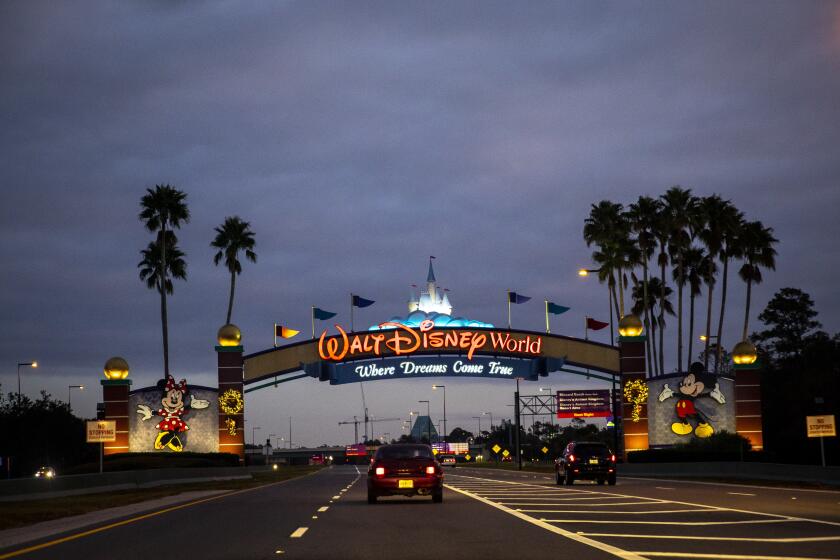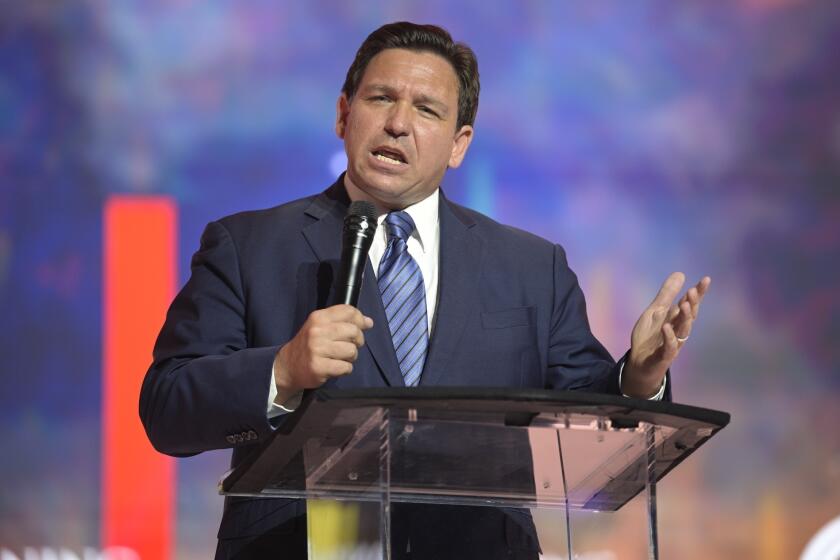How strong is Disney’s 1st Amendment case against Ron DeSantis?

- Share via
With its lawsuit against Florida Gov. Ron DeSantis, Walt Disney Co. has drawn new battle lines in the nation’s roiling culture war over LGBTQ+ issues — taking aim at the likely presidential hopeful for allegedly violating its rights in a battle for control of land encompassing its Orlando-area resorts.
The Republican governor and his political allies have waged a yearlong battle with Disney to wrest away control of the 27,000 acres of land administered by what was long known as the Reedy Creek Improvement District, which gave the company unusual self-governing powers.
Disney and Florida Gov. Ron DeSantis have a long-running battle over the company’s self-governing powers in the area encompassing Walt Disney World Resort.
Disney asked a federal court to invalidate the state’s actions, reinstate its contracts and protect its powers over the long term to control development of Walt Disney World, where it said it has plans to invest $17 billion over the next decade.
Disney’s 74-page complaint, filed this week in U.S. District Court for the Northern District of Florida, argues that DeSantis violated the company’s 1st Amendment rights by retaliating against it for speaking out last year against the state’s so-called Don’t Say Gay law, which limited classroom discussion of sexual orientation and gender identity.
DeSantis dismissed the lawsuit as an attempt by Disney to hold on to extraordinary privileges that aren’t afforded to other companies in Florida. A spokeswoman called it an attempt by Disney “to undermine the will of the Florida voters.”
In truth, the case is more complex than either side suggests, having to do with agreements dating to the 1960s that have allowed the Burbank-based company to run a 43-square-mile district — featuring multiple resorts including Magic Kingdom and Epcot — essentially as its own local government.
The fight is a proxy battle in the nation’s broader debate over LGBTQ+ rights — one that could draw political blood from a leading 2024 presidential contender and puts a family friendly entertainment brand at the center of an all-out political brawl.
Disney has framed DeSantis’ decision-making as not only politically motivated, but also financially reckless and constitutionally baseless.
Legal and political experts said the lawsuit marks a significant escalation of tensions between a powerful governor and one of his state’s largest economic engines. Disney is responsible for more than $1 billion in local and state taxes in Florida annually.
Disney sues Gov. Ron DeSantis, pegging the would-be Florida dictator as a petulant child trampling over constitutional rights.
“It’s mind-boggling — it really blows the mind — that it has devolved now to the point that we’re going to have this massive lawsuit,” said Aubrey Jewett, a political science professor at the University of Central Florida. “It’s amazing to me that the governor and the Republican Legislature are willing to savage Disney and risk economic growth ... over this one dispute.”
DeSantis’ willingness to take the matter so far is evidence of the value he places in developing his reputation as a conservative leader attacking the “woke” agenda of the progressive left — including on LGBTQ+ issues, which Republicans have used as a political wedge.
DeSantis is looking for ways to distinguish himself in the election from former President Trump, who remains a juggernaut in the Republican primaries, and has taken on anti-LGBTQ+ causes with particular verve.
Taking a stand against Disney could bolster DeSantis in the eyes of some of the party’s conservative base. But it also exposes him and his administration to bruising litigation and fact-finding efforts by Disney’s legal team — which will no doubt try to cast the governor as vindictive and shortsighted.
“Disney, if this suit goes forward, will have the opportunity to demand of DeSantis and his subordinates every piece of paper that they’ve exchanged on anything having to do with Disney during a certain time period,” said Paul Barrett, deputy director of the Center for Business and Human Rights at New York University’s business school. “They’ll have to cough that up.”
The more than 50-year-old deal that granted Disney’s far-reaching powers in Florida was indeed one of a kind. State officials created a special district in 1967 that allowed Disney to run its resorts with sweeping autonomy, in exchange for the company’s promises to drive central Florida’s economy.
Walt Disney first eyed the Orlando area for a new, East Coast kingdom in the 1960s — and Florida officials were more than happy to work alongside him to make the development happen.
Current conflict is the latest to reveal underlying tensions that have existed between Disney and religious conservatives for decades as it has embraced the LGBTQ community.
Under the auspices of the Reedy Creek Improvement District, Disney could essentially tax itself and issue municipal bonds to transform the area’s empty swampland into an international tourism destination complete with its own town centers, sewage and drainage systems, and transportation lines.
Until recently, Florida didn’t voice many qualms. The company was a corporate darling of the state, contributing huge amounts of tax revenue and local jobs, not to mention campaign donations to elected officials.
Disney’s lawsuit contends that concerns about its power emerged after it spoke out against the Parental Rights in Education bill — a claim it supports by quoting DeSantis and other Florida leaders making that exact point.
In the latest volley in the ongoing feud between Ron DeSantis and Walt Disney Co., the Florida governor suggested Monday that the state could assert control over land around Disney World.
According to Disney’s complaint, DeSantis said the company had “crossed the line” and immediately launched “a coordinated campaign” to hurt the company and strip it of its local governing authorities — what the company called “as clear a case of retaliation as this Court is ever likely to see.”
Disney’s complaint notes that just days after DeSantis signed the “Don’t Say Gay” bill into law and Disney issued its statement in opposition to it, DeSantis said state officials were “certainly not going to bend a knee to woke executives in California.”
A few weeks later, according to Disney’s complaint, a fundraising email from DeSantis’ campaign went out stating, “Disney and other woke corporations won’t get away with peddling their unchecked pressure campaigns any longer.”
Florida’s Legislature last year voted to dissolve the Reedy Creek district. Disney’s complaint cites a Florida lawmaker at the time saying: “You kick the hornet’s nest, things come up. And I will say this: You got me on one thing, this bill does target one company. It targets the Walt Disney Company.”
Later, instead of dismantling the district, DeSantis in February appointed new supervisors to replace the Disney-controlled board that runs it, renaming the body the Central Florida Tourism Oversight District.
Disney managed to sign contracts with the previous oversight board that protected much of its control over the operation and continued development of its resorts before the new body took over, but the new board promptly ruled those contracts null and void. That decision was quickly followed on Wednesday by Disney’s lawsuit.
Jacob Schumer, a land-use and local government attorney in Florida who has been following the dispute, said Disney has the stronger case.
He doesn’t buy the state’s argument that Disney’s control over the land around its developments is illegitimate because it represents a corporate usurpation of government powers.
“These agreements are pretty standard when it comes to developments in Florida,” Schumer said. “They are not out of the ordinary in the kinds of things they do, though they are definitely out of the ordinary in how much they grant to Disney.”
Disney also has a strong argument that the state’s unilateral decision to void the company’s contracts with the district was questionable. Arguments that the contracts were signed in violation of state law may hold some weight, but not if the missteps in question were all made by former district officials.
“They can’t go back and say, ‘Nevermind, we aren’t bound by our contracts because we made mistakes,’” Schumer said.
Schumer said it will be harder for Disney to convince the federal court to demand the state of Florida take certain actions in relation to the special district, such as reconstituting its former structure, because that would amount to the federal government telling a state how to structure its own local governments.
Then there are the 1st Amendment issues.
Barrett, of NYU, said Disney’s retaliation claim is a strong one because corporations have substantial rights to express their views under the 1st Amendment, just as individuals do, and DeSantis seems to have targeted the company for doing just that.
“DeSantis has publicly and repeatedly singled Disney out, and I think there is what the lawyers would call prima facie evidence — evidence on the surface — that appears to support the claim that the company is being punished because of its political views,” Barrett said.
And that’s just what’s been said in public, he said — not what could be revealed in internal DeSantis administration communications laid bare through discovery.
More to Read
Sign up for Essential California
The most important California stories and recommendations in your inbox every morning.
You may occasionally receive promotional content from the Los Angeles Times.


















